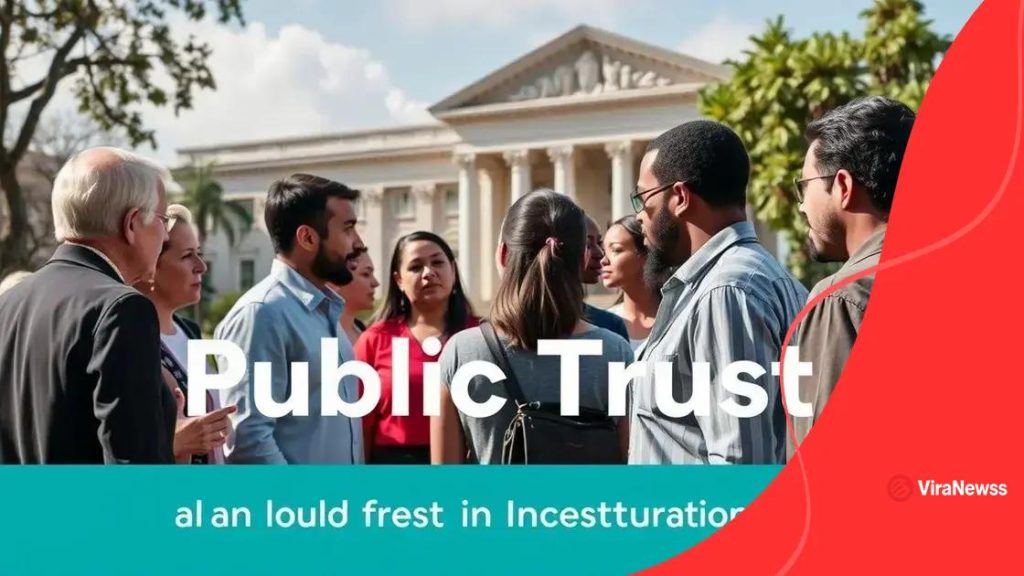Public trust in institutions surveyed: what the data reveals

Anúncios
Public trust in institutions can be rebuilt through transparency, accountability, community involvement, and effective communication, fostering stronger relationships between institutions and citizens.
Public trust in institutions surveyed unveils critical insights into how citizens engage with and perceive their governing bodies. Have you ever wondered how trust shapes our interactions with these entities? Let’s explore the data together!
Anúncios
Understanding public trust: definition and importance
Understanding public trust is essential for a healthy democracy and society. It refers to the confidence that individuals have in the institutions that govern them. When citizens trust their leaders and organizations, they are more likely to engage and participate in civic activities.
Definition of Public Trust
Public trust can be defined as the belief that institutions will act in the best interests of the public. This trust forms the foundation of a functioning society. When institutional actions align with citizens’ expectations, trust is strengthened.
Importance of Public Trust
Having high levels of public trust is crucial for the stability and effectiveness of institutions. It leads to various benefits, including:
Anúncios
- Enhanced cooperation between citizens and government.
- Increased participation in community and democratic processes.
- Lower costs for providing services due to greater compliance and engagement.
When trust is lacking, the consequences can be severe. Citizens may become disengaged, leading to a cycle of disillusionment and frustration. Without trust, even well-intentioned policies may fail.
Moreover, understanding the dynamics of public trust helps identify the factors that influence it. Issues like transparency, accountability, and responsiveness play significant roles. When institutions demonstrate these qualities, they can foster stronger connections with the community.
Defining and nurturing public trust is not just about improving relationships between the government and its citizens; it’s about ensuring a more prosperous society. By focusing on building trust, everyone can participate in shaping their communities more effectively.
Key factors affecting institutional trust
Understanding the key factors affecting institutional trust is vital for citizens and leaders alike. Trust can fluctuate based on several elements, including transparency, accountability, and communication. Each plays a crucial role in how institutions are perceived by the public.
Transparency
Transparency in government actions and institutional processes cultivates trust. When institutions openly share information, it helps build confidence among the public. Clear communication about policies, decisions, and performance indicators allows citizens to feel informed and engaged.
Accountability
Accountability is another significant factor. Institutions must take responsibility for their actions and decisions. When leaders respond to issues and admit mistakes, it fosters a sense of trustworthiness. Citizens want to know that their leaders will address concerns and make necessary changes.
- Effective complaint resolution processes.
- Regular public reports on performance.
- External audits to ensure fairness.
Moreover, community engagement enhances institutional trust. When citizens are included in decision-making processes, they feel valued and respected. Participation in discussions allows for diverse voices, leading to policies that better reflect public needs.
Cultural factors also influence trust levels. In some societies, historical experiences with institutions shape attitudes towards trust. For instance, past corruption scandals can leave lasting scars. Addressing these issues is critical in rebuilding trust over time.
Improving educational outreach about institutional functions can also fortify trust. When citizens understand how systems work, they may feel more confident interacting with them. Informative campaigns can demystify the roles and responsibilities of various entities.
Recent survey results on public trust

Recent survey results on public trust reveal important trends that affect how citizens view their institutions. Understanding these results can help identify areas for improvement and growth in public confidence.
Current Trust Levels
According to the latest surveys, there has been a notable shift in public trust levels over the past few years. Many institutions, such as governments, media, and non-profits, have seen varying degrees of trust from the public. While some institutions have maintained high trust levels, others have struggled.
Factors Influencing Trust in Surveys
Various factors contributed to these changes. Key influences include:
- Response to crises, such as the COVID-19 pandemic.
- Media coverage and public perception.
- Historical events impacting public sentiment.
Furthermore, age and demographic factors also play a role. Younger generations tend to have different trust levels than older generations. They often seek more transparency and accountability, affecting the overall perception of institutions.
Interestingly, some surveys show a direct correlation between community engagement and higher trust levels. When institutions actively involve citizens in decision-making, trust tends to increase significantly. This engagement fosters a feeling of connection and responsibility.
These findings highlight the importance of adapting strategies to improve public trust. Institutions must be proactive in their communication and actions to rebuild and maintain confidence.
Implications of low public trust for society
The implications of low public trust for society are significant and far-reaching. When trust in institutions declines, the effects can be seen in various aspects of daily life and community dynamics. Citizens may become more disengaged, viewing their leaders and institutions with skepticism.
Social Cohesion
Low levels of public trust can lead to a decrease in social cohesion. When people do not trust their government or public institutions, they are less likely to work together for the common good. This division can create a fragmented society where individuals prioritize personal or group interests over collective well-being.
Participation in Democracy
In addition, declining trust can impact democratic participation. Citizens who lack faith in their institutions often feel disillusioned, leading to lower voter turnout and engagement in civic activities. This disengagement can perpetuate a cycle of mistrust, as without participation, ineffective policies may continue.
- Increased apathy towards voting and local governance.
- Reduced community involvement in decision-making processes.
- Difficulty in implementing effective policies that require public support.
The marketplace of ideas can also suffer. When trust is low, the communication between institutions and the public may break down. Institutions may struggle to disseminate important information or mobilize support for initiatives. This can stunt innovation and hinder progress in addressing community needs.
Furthermore, low public trust undermines the credibility of governmental and non-governmental organizations alike. If citizens view these entities with suspicion, they may disregard vital information that could enhance public safety and welfare. It is crucial for institutions to work on rebuilding this trust to restore confidence in their operations.
Strategies to rebuild trust in institutions
Strategies to rebuild trust in institutions are essential for fostering collaboration and ensuring effective governance. As public confidence wanes, institutions must take proactive measures to restore faith in their operations. Building trust requires transparency, accountability, and genuine engagement.
Enhancing Transparency
One of the key steps to rebuilding trust is enhancing transparency. Institutions should regularly share information about their activities, decisions, and performance metrics. Open communication can help demystify processes and provide citizens with the knowledge they need to feel informed.
Promoting Accountability
Accountability is crucial in establishing trust. Institutions must be willing to admit mistakes and rectify them promptly. Creating mechanisms for feedback and public oversight encourages accountability. This can include:
- Regular audits of institutional practices.
- Public forums for discussing concerns and solutions.
- Clear channels for reporting misconduct.
In addition, involving the community in decision-making processes can significantly enhance trust. When citizens feel that their voices matter, they are more likely to engage positively with institutions. Institutions can host community workshops or forums to gather input and address local issues in collaboration with residents.
Personalizing communications also plays a role in rebuilding trust. Using simple language and relatable narratives helps connect with the public. When institutions share stories of positive impact and sincere efforts, it can foster a more approachable image.
Furthermore, educational initiatives about the roles and functions of institutions can empower citizens. Providing accessible information helps demystify governmental processes, which can alleviate concerns and build trust over time.
FAQ – Frequently Asked Questions about Rebuilding Trust in Institutions
What are the main strategies to rebuild public trust in institutions?
The main strategies include enhancing transparency, promoting accountability, involving the community, and communicating effectively.
Why is transparency important for trust in institutions?
Transparency helps build trust by ensuring that citizens are informed about decisions and actions taken by institutions.
How can community involvement improve trust?
Community involvement allows citizens to feel valued and heard, fostering a stronger connection with institutions.
What role does communication play in rebuilding trust?
Effective communication uses clear and relatable language, which helps to break down barriers and improve relationships with the public.





